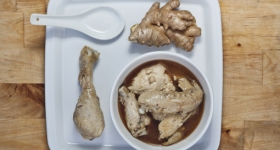Last week, a great [FATHER/HOOD] post on Ebony went up about sacrifice and parenting:
To me, sacrifice always denotes a profound loss, or something given away through violence. The meaning of the word has changed over time, but I experience it as the foundation of a kind of deficit.
I don’t want to think of anything related to my child as a loss. I’ve made choices. Some have been very hard, but they’ve been choices. I’ve never once thought of anything I’ve done for my kid as any type of sacrificial act.
Not a few days later, a friend shared a link to a discussion on mothers' bodies. The discussion was centered around a kickstarter for a photography project intended to celebrate women's bodies after they have experienced birth, stretch marks and all. I won't go into the details of the discussion -- comments predictably ranged from disgusted to empowered -- but one word I did see thrown around a lot was "sacrifice." That bearing children was a profound sacrifice of the body, that mothers make physical and spiritual sacrifices for their families, and that mothers should be honored for making such sacrifices.
I had been thinking about the idea of sacrifice and how this plays into my philosophy of parenthood for the past few months. Sacrifice is one of the major themes in the immigrant narrative; children of immigrants may not know that sacrifice intimately, but we are at least remotely aware that our parents gave up something, sometimes many things, in order to give us "a better life." The stories we hear about sacrifice are usually meant to instill in us a sense of duty.
Having been raised in a Catholic family, sacrifice in motherhood took on a whole new meaning for me. My first child was unplanned, and her father and I were still in the figuring-things-out stage of our lives and in our relationship when I got pregnant. I didn't do things "the right way" and sacrifice was to be a form of punishment for me. I was supposed to sacrifice things -- my youth and my freedom, namely -- and I was supposed to view and honor these things as sacrifices, as a form of repentance.
But the problem with constantly associating parenthood with sacrifice is complex. It puts enormous pressure on us parents to eschew parts of our identity; we're not supposed to be cool or have fun anymore. For mothers, especially, the pressure to do it all in order to have it all is profound. Viewing motherhood as a physical sacrifice suggests that the ways our bodies change after bearing children are bad, or at least not as good as before; we long for our younger, tighter bodies free of stretch marks, rather than understanding our post-birth bodies as having undergone a natural physical transformation. It also puts an undeserved psychological burden on our children -- by stressing the "sacrifice" part, we're indirectly telling them about the things we could have had, and handing them a debt that needs to be repaid.
And in the first few years of my daughter's life, I felt enormous pressure from my family to be a martyr, to eschew a social life and nearly give up my identity in order to prove that I was a decent mother and not an irresponsible failure. I had been told up and down by my elders that my life would be over once I had kids, so I had better make sure I was ready; this was my sex education. I didn't feel I was being a good mom if I wasn't spending every moment not at work with my little one, and I couldn't take even an hour of me-time without feeling profoundly guilty. I had sensed throughout my life that this is what my mother did for me.
But this model of parenting wasn't sustainable for me. After becoming a mom, I allowed myself to forgo a lot of necessary self-care and ended up missing a lot of my daughter's babyhood simply because I was too tired, too frazzled, and too stressed to enjoy myself in the moment.
In the [FATHER/HOOD] post, Shawn Taylor so eloquently stated my own feelings about the parenthood experience, once I decided to flip the script. I have made choices for my kids, but I've never viewed them as any sort of loss. I gave up partying long before my daughter was even a twinkle in my eye, and was laid off from a job in a dying industry before I'd even told anyone I was having a kid. If anything, my kids gave me a direction in life when I had none. Through pregnancy and breastfeeding, my body gained superpowers. Having a child put me on the hook to work on a relationship I wanted to be in but might have walked away from if the circumstances were different. I realize that things don't always work out like this for other people in similar situations. Rather than make sacrifice part of my parenting philosophy, I'm more inclined to focus on how the choices I've made added to my life.
I never wanted to associate my children with sacrifice, but admitting this doesn't mean I am not aware of and appreciative of the sacrifices my parents made for me. I try to honor the choices my mom made for me without feeling guilty for forcing her hand. But I gained everything by having my kids, and I consider myself extremely fortunate and indebted to them.










Comments